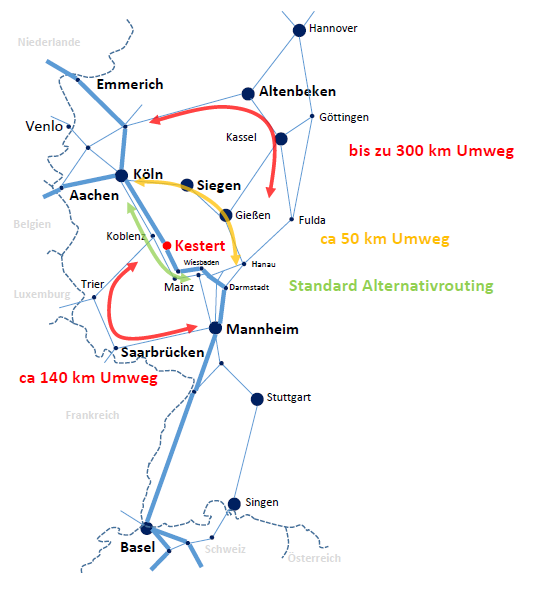Rhine valley still closed-DB Netz urged to act 09/04/21
< ZurückSource: https://www.railfreight.com/railfreight/2021/04/09/rhine-valley-still-closed-db-netz-urged-to-act/
The landslide in the Middle Rhine Valley on 15 March continues causing significant disturbances on rail freight operations. After the incident, restoration works have been going on for more than three weeks now, while there is no concrete forecast regarding the return to normal operational conditions. According to the rail infrastructure manager DB Netz, the trains should run as soon as possible. However, safety comes first, meaning that traffic restoration could, and most probably will, require more time than initially planned.
Stabilising the rocky slopes seems to be way more challenging than DB Netz and its team of experts estimated. The landscape’s sensitive nature combined with the terrain’s unstable components (clay, slate rocks, sandstone) makes it difficult to work fast and provide factual information for the corridor’s reopening. Additionally, besides ensuring that the slopes will not cause problems again soon, DB Netz has to deal with the practical task of removing the fallen rocks from the railway tracks.
In the meantime, the infrastructure managing company stated that the corridor would reopen sometime during April. Moreover, it said that “freight traffic in the Middle Rhine Valley runs reliably” since most trains are redirected through Rhine’s left bank via Bingen. These particular statements gathered strong criticism from rail freight operators using the Rhine Valley route and probably constitute the real and very deeply rooted problem of the whole situation.
Spektakulärer Felsrutsch im Mittelrheintal / Livestream am Samstag! Video: https://youtu.be/VZmebZth2_s
Multifaceted complaints
Since the second week of the disruption, the Network of European Railways (NEE) criticised DB Netz for poor crisis management, lack of sufficient communication and inadequate alternative routes for freight trains that cost money and time. NEE’s perspective was quite clear and in total contrast with DB Netz’s: not only didn’t the majority of trains divert through the Rhine’s left bank, but many of them used routes that added up to 300 extra kilometres of travelling. On top of that, the infrastructure manager failed to provide realistic forecasts concerning the operations resuming or even provide the basic information concerning crisis handling.
Railway companies also expressed their concerns and complaints about the current status in the Rhine Valley and the infrastructure manager’s stance. SBB Cargo International, for instance, underlined that adequate traffic management in DB Netz’s network is way more important than coming up with possible train diversions.
Moreover, it brought on the surface another critical topic. Railway undertakings using the specific network have urged since 2018 the need for an ‘Incident Manager’ to take over control in situations like the landslide. Understandably, there has been no such provision, and the results are currently visible, causing immense problems in international rail freight traffic. Hupac shares the same perspective as SBB. Since the beginning, it demanded more attention on management that should prioritise rail freight and more action from the responsible parties. If the opposite applies, then the effects could be detrimental both for the rail sector and the long-term EU green goals.
 Map of diversions. Source: NEE
Map of diversions. Source: NEE
Issue of a cultural nature
As mentioned above, the closure of the Middle Rhine Valley is already taking place for three weeks. The most optimistic estimations said that rail freight traffic would be restored around Easter. Easter is now long gone, and rumours have it that the closure will last for at least two more weeks. It has been practically proven that the proposed diversions are not functioning to the interest of railway undertakings that face many hurdles: lost profits, delays, longer transit times, and a questioned reliability.
It seems that it’s in DB Netze’s hands as the region’s infrastructure manager to change the situation for the better. However, this mission might not prove so facile. According to Hans-Willem Vroon, Director of RailGood, the current situation is not unprecedented. Germany has found itself in the same position many times before and used the same approach to resolve the occurring problems. Only that this time things are different. Rail’s profile and dynamics have changed, and the fact that it finds itself in the foreground of important political agendas is an unshakable proof of this.
Rail is also acquiring a different position in the public’s consciousness with all its environmental benefits. Rail, however, still needs to gain the trust of the markets, and cases like this are not going to help it achieve this objective. Vroon highlighted that DB Netze, at this moment, lacks three very basic things: communication, reliable forecasts and entrepreneurship. It is about time for a cultural change on behalf of the infrastructure manager that oughts to start treating rail like a business and show accountability and responsibility, he added.
After traffic’s restoration in the Rhine Valley, the worst-case scenario is to forget that it ever happened and continue with the operations and infrastructure management as usual. On the other side, Vroon concluded, this could also be a perfect opportunity for lessons to be learned and for valuable changes and adjustments to take place. In this way, rail freight’s leading future role will not remain a theoretical potential, but it will become a reality.





